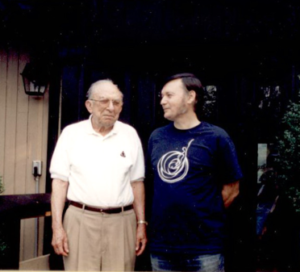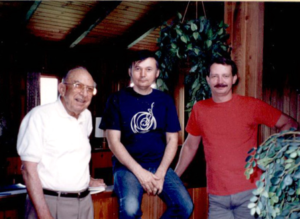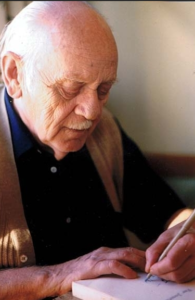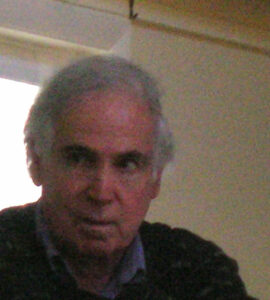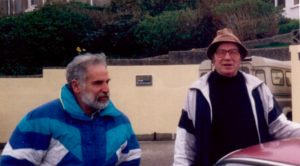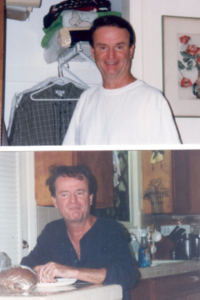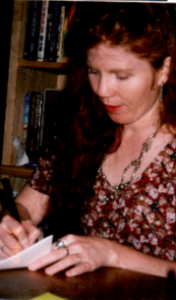
Kelly, signing a book
In the summer of 1992, a prospective author in California called, wanting to know if Hampton Roads might be interested in looking at a thousand-page manuscript novel on the lives of Martha and Thomas Jefferson. I explained that we mostly did metaphysical books, but that I had a deep interest in history, and I’d give her my opinion of it, if that was worth her time and postage. And that undramatic exchange was the beginning of my dealings with Kelly Joyce Neff.
The manuscript was so good! I read it right through in a week, at the office by day and at home by night. I had read a good deal about Jefferson, but nothing had brought him, let alone Martha Jefferson, so vividly to life. I couldn’t see how Hampton Roads could publish it, but I sent Kelly a letter meant to be helpful (just as I had done previously with Ed Carter). I made a few suggestions, and then asked if she would consider deleting its many intimate scenes and conversations, as we in the twentieth century couldn’t know the inner lives of these people from the eighteenth century. Fateful question!
By return mail she came clean: “I speak not as an outside observer, but as one who lived with and amid Thomas and Patty. You might understand that I have been very cautious about going public with such information, for I have no desire to be taken for a nut, or to have my credibility as a scholar questioned. What I know does not invalidate my ability to sleuth out validations of it, but I doubt the public at large is ready to hear the truth. I am only telling you to assuage your qualms. … You are free to think of me as a nut if you wish.”
She thought she had been Martha Jefferson! That would explain the vivid, sure-footed description., but was it possible? She didn’t strike me as crazy, but how could I judge? I was willing to leave the question open.
After that, we corresponded throughout September and into October, but I still wasn’t thinking of her as a psychic. I thought of her in terms of Jefferson, and of writing, and of scholarship. This although she had told me she was accessing past-life memories!
Kelly had established a reputation as a Jefferson researcher; she was going to participate in a Jefferson conference at Monticello in October. I invited her to stay at my house on the weekend following. (This was something my wife and I sometimes did. We enjoyed getting to know authors, who were generally interesting people.) But immediately after she called from Charlottesville to say she had arrived, my mother called: My uncle had just died. I drove up to New Jersey for the funeral on Saturday, and didn’t get back till late Sunday afternoon.
Over the weekend, Kelly had used her anthropological training and her inner guidance to find the foundations of Martha Jefferson’s childhood home. I finally realized: She was in the habit of talking to what she called “the guys upstairs.” She was psychic! She had done past-life research! She could help others do the same. She and I talked nonstop from 8 p.m. to 2 a.m.
The first thing I asked was why I was helping with her manuscript even though Hampton Roads was unlikely to publish it. [Although, ultimately we did, as Dear Companion.] She said it was a reversal of form. We had been together in an English monastery in the middle ages. She had been a monk, the head of the scriptorium, responsible for recopying books. I was a young man from a wealthy family, a second son. Instead of buying his way to a bishopric, his linguistic abilities were fostered and he was trained in secret ways. (What that was all about we didn’t find out right away!)
Just that easily, she and I started to work together. Something she would say would spark a knowing in me; something I would say would bring forth further detail from her. We’d get a word or a name or a knowing. I took notes, but I didn’t think to tape-record the session. In my journal next day I said that she “turned out to be a big surprise.” Over the next few weeks, her presence transformed my sense of possibilities. For the first time I had a partner experienced in the methods of research.
At just this time, Bob said that maybe Monroe would feel more comfortable about our proposal to distribute his Hemi-Sync tapes to bookstores (a proposal that had been hanging fire for three years) if he and I did Gateway together. He said we could have the company pay for it. I was on the phone instantly. November was booked up, but the first week of December had two openings. I signed us up, and began waiting impatiently.
Kelly continued to encourage and exhort me by every post. She insisted I knew how to do the things I wanted to do, if I would only let myself do them. On October 31, expressing her frustration at my caution and self-doubt: “My dear old one, don’t you ever read anything you publish? You know all of this! What is holding you back from it manifesting in your life? Why do you question where your knowing of past incidences and all comes from ? This is not meant as a criticism!!! But it anguishes me to see you ground-bound, when I know you can fly. The other part says, ‘have patience, he has chosen this unremembering for its lessons, its experience.’”
One day that fall, I noted that I was quietly restless, that money was extremely low, “yet I am not worried; hardly touched. It is something within, saying, there’s always more, don’t worry about it. And I do not. …”
And why did I not? Because Kelly “has turned my life upside down, or rather has opened it into wider channels. Between her and [certain others] and the prospect of going to TMI for Gateway, and the opening up of communications with people in so many places, physical and psychic, I am ready to burst out into new levels of awareness. Or so it feels. … If only I could have the little bit—that giant bit—of external reinforcement that would be breakthrough into direct memory—and into direct powers of perception and management—”
By the time Bob and I left for Gateway in early December, 1992, I had had several weeks of work and intense communication with Kelly, which had given me more growth than I had gotten in my entire life with the exception of my time twenty years earlier working with Louis Meinhardt. Kelly and I, working together, swapping insights and questions and knowings by mail and telephone, had helped each other immensely. From me she got acceptance and eager cooperation. From her I got direction and encouragement.
Of course, as soon as I got home from Gateway, she was one of the first people I called. Right off, I asked if she knew anything about some detail of Monroe training. She said, sort of humorously wearily, that yes, she had heard quite a bit about it lately. Turned out that all the time I was talking to her, she was hearing me. “It was like direct feed,” she said. She provided confirmation of details I had seen; and more confirmation came as I received her letters written while I was at Gateway.
The Gateway experience can leave its graduates gasping, somewhat. So much happens, so quickly. Sometimes it helps to have pointers, and not everyone’s life provides them. For me, it was a quantum leap, because in Kelly I had essentially immediate verification. I can’t think of anything more important in helping me to integrate—and therefore retain—my new abilities after I went back to the so-called “real” world.
In getting to know an undoubted psychic, I had been freed from doubting that such people and abilities exist. This had allowed me to begin to find and develop those same abilities within myself. Processing her feedback after I returned, and working with her at an ever more intense level in the weeks and months that followed, I got a surer sense of what I could and couldn’t do; what I could and couldn’t trust. All that changed with time, of course, but as a means of speeding up my initial learning, the relationship was invaluable. It made all the difference.
